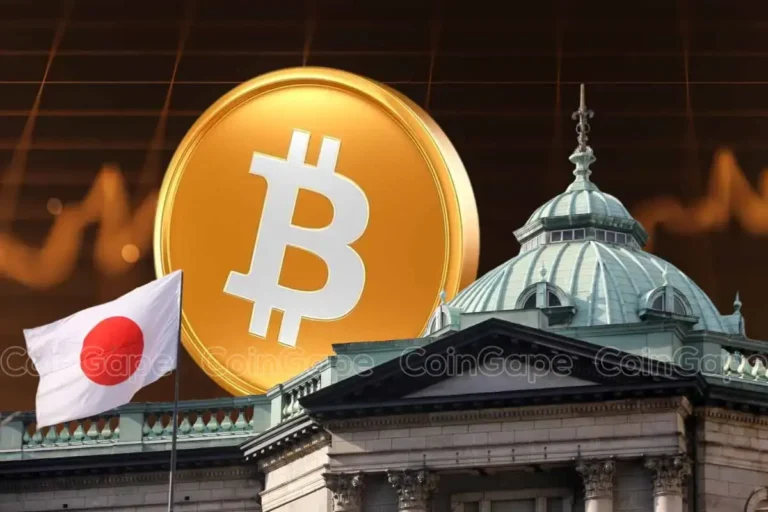Michael Saylor Says Bitcoin Is Hope for Japan As Yen Collapses to 34-Year Low

Highlights
- Japan's Yen collapses to 34-year low falling the lowest since 1990.
- Analysts say that Bitcoin provides a "sound money" alternative against this collapsing fiat assets.
- If Japan sells USD to protect Yen from falling, it would be positive for cryptocurrencies.
The global macros continue to show worrying signs as the Japanese Yen has collapsed to a 34-year low against the USD. Moreover, the weakness in Yen is fueled by a strong USD. The stubborn U.S. inflation has forced the Fed to keep holding interest rates higher for a longer period than expected. As the Japanese central bank seeks to navigate through this, top analysts are suggesting Bitcoin as the next major hope for Japan against its falling currency.
Bitcoin Is A Sound Money
Following this drop in the Yen value, the Bitcoin price against the Japanese currency skyrocketed. This led to a strong chatter on social media that fiat is dying and that Bitcoin is the new hope for “sound money”. Private players in Japan have already started adopting Bitcoin. Earlier this week, Japanese public firm Multiplanet bought $6.25 million worth of Bitcoins.
🚨 BREAKING 🚨
JAPANESE YEN, THE 3RD LARGEST CURRENCY, HAS LITERALLY GONE TO ZERO AGAINST BITCOIN
FIAT IS DYING, BITCOIN IS RISING pic.twitter.com/uiwqrHeRyH
— Ash Crypto (@Ashcryptoreal) April 25, 2024
Even some of the top Bitcoin proponents like Michael Saylor said that “Bitcoin is hope for Japan”. Users reaffirmed what BTC maximalist Michael Saylor characterizes as “Bitcoin’s superior design,” acknowledging Satoshi Nakamoto’s framework, which mandates a limit of only 21 million BTC in existence. This cap is immutable as it is ingrained into BTC’s blockchain protocol. Through halving events, the system curtails inflation by diminishing the issuance of new tokens circulated.
How Japanese Yen Fluctuations Can Impact Crypto?
The Japanese yen (JPY) experienced a further 1.3% decline throughout the day – a significant movement for a major currency – reaching its lowest point against the U.S. dollar since 1990. This drop followed the Bank of Japan’s (BOJ) decision to maintain interest rates close to zero without expressing substantial concern regarding the yen’s depreciation. On the other hand, Japanese banks are seeking exposure to deposit-backed stablecoins.
Although the yen’s devaluation has not yet affected cryptocurrency markets, this scenario may alter if the BOJ intervenes to bolster the currency. Such intervention could involve the BOJ selling U.S. dollar assets (specifically U.S. Treasuries) to purchase yen, potentially resulting in a weaker dollar that could, theoretically, benefit cryptocurrency prices.
Alternatively, intervention might stem from U.S. policymakers opting to inject liquidity into the markets, which could provide support for risk assets such as cryptocurrencies.
- Expert Predicts Deeper Bitcoin Decline as JPMorgan CEO Warns of Similarities to the 2008 Financial Crisis
- Trump Won’t Pardon FTX’s Sam Bankman-Fried (SBF), White House Says
- Third Spot SUI ETF Goes Live as 21Shares Fund Launches on Nasdaq
- Mark Zuckerberg’s Meta Reportedly Eyes Stablecoin Integration This Year Amid Regulatory Clarity
- Coinbase Rivals Robinhood As It Rolls Out Stocks, ETFs Trading In ‘Everything Exchange’ Push
- Cardano Price Signals Rebound as Whales Accumulate 819M ADA
- Sui Price Eyes Recovery as Third Spot SUI ETF Debuts on Nasdaq
- Pi Network Price Eyes a 30% Jump as Migrations Jumps to 16M
- Will Ethereum Price Dip to $1,500 as Vitalik Buterin Continues Selling ETH?
- XRP Price Outlook as Clarity Act Passage Odds Plunge to 53%
- COIN Stock Risks Crashing to $100 as Odds of US Striking Iran Jump

 Claim Card
Claim Card














